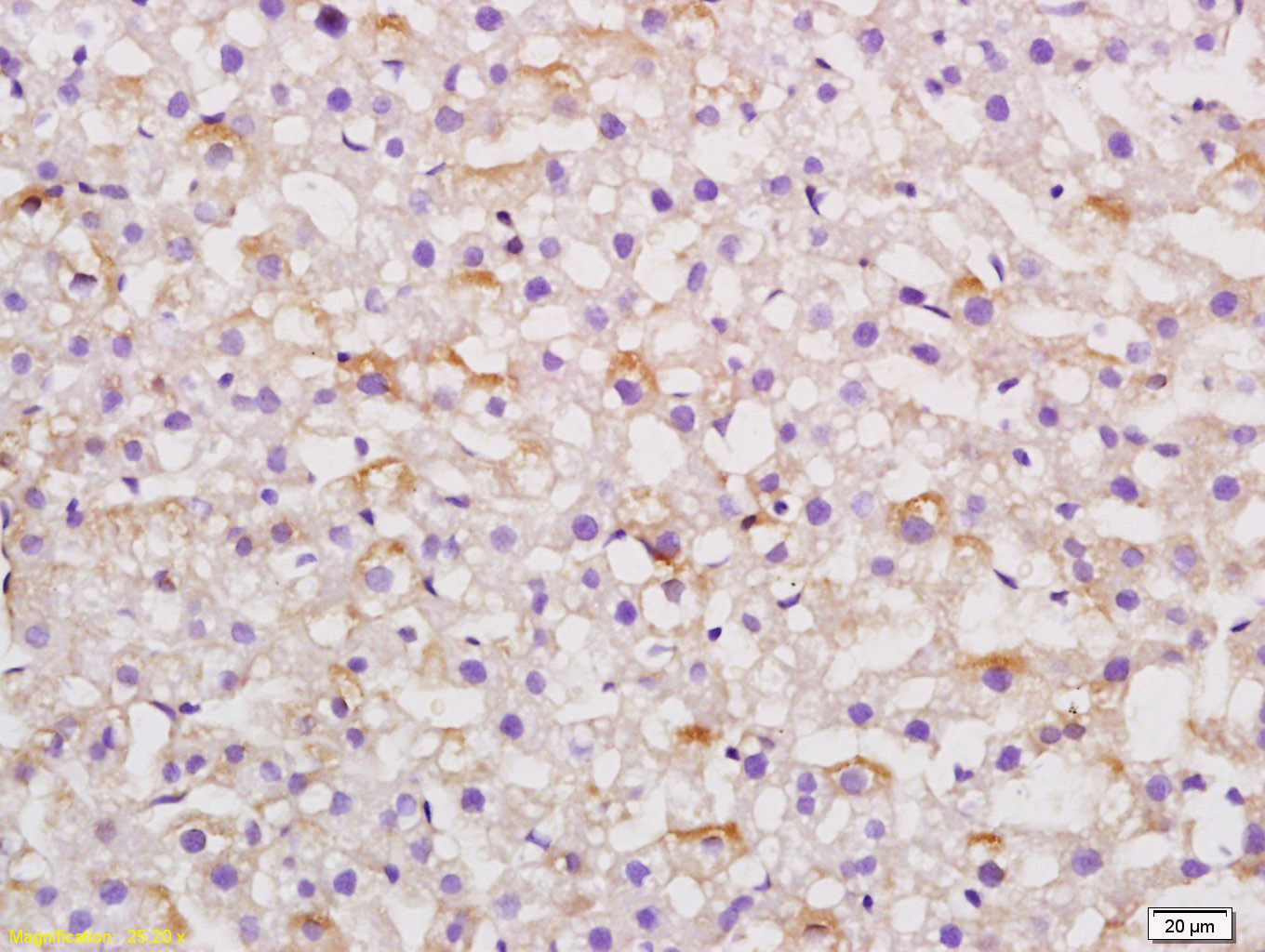
Mouse Anti-Angiotensinogen antibody
Angiotenogen; AT; ANGT_HUMAN; Serpin A8.
View History [Clear]
Details
Product Name Angiotensinogen Chinese Name 血管紧张素原抗体 Alias Angiotenogen; AT; ANGT_HUMAN; Serpin A8. literatures Research Area Cardiovascular Immunogen Species Mouse Clonality Polyclonal React Species Rat, (predicted: Human, Mouse, ) Applications IHC-P=1:100-500 IHC-F=1:100-500 IF=1:100-500 (Paraffin sections need antigen repair)
not yet tested in other applications.
optimal dilutions/concentrations should be determined by the end user.Theoretical molecular weight 49kDa Cellular localization Secretory protein Form Liquid Concentration 1mg/ml immunogen KLH conjugated synthetic peptide derived from human Angiotensinogen: 51-110/477 Lsotype IgG Purification affinity purified by Protein A Buffer Solution 0.01M TBS(pH7.4) with 1% BSA, 0.03% Proclin300 and 50% Glycerol. Storage Shipped at 4℃. Store at -20 °C for one year. Avoid repeated freeze/thaw cycles. Attention This product as supplied is intended for research use only, not for use in human, therapeutic or diagnostic applications. PubMed PubMed Product Detail Angiotensinogen protein encoded by this gene, pre-angiotensinogen or angiotensinogen precursor, is expressed in the liver and is cleaved by the enzyme renin in response to lowered blood pressure. The resulting product, angiotensin I is then cleaved by angiotensin converting enzyme (ACE) to generate the physiologically active enzyme angiotensin II. The protein is involved in maintaining blood pressure and in the pathogenesis of essential hypertension and preeclampsia.
Function:
Essential component of the renin-angiotensin system (RAS), a potent regulator of blood pressure, body fluid and electrolyte homeostasis. In response to lowered blood pressure, the enzyme renin cleaves angiotensinogen to produce angiotensin-1 (angiotensin 1-10). Angiotensin-1 is a substrate of ACE (angiotensin converting enzyme) that removes a dipeptide to yield the physiologically active peptide angiotensin-2 (angiotensin 1-8). Angiotensin-1 and angiotensin-2 can be further processed to generate angiotensin-3 (angiotensin 2-8), angiotensin-4 (angiotensin 3-8). Angiotensin 1-7 is cleaved from angiotensin-2 by ACE2 or from angiotensin-1 by MME (neprilysin). Angiotensin 1-9 is cleaved from angiotensin-1 by ACE2.
Angiotensin-2 acts directly on vascular smooth muscle as a potent vasoconstrictor, affects cardiac contractility and heart rate through its action on the sympathetic nervous system, and alters renal sodium and water absorption through its ability to stimulate the zona glomerulosa cells of the adrenal cortex to synthesize and secrete aldosterone.
Angiotensin-3 stimulates aldosterone release.
Subunit:
During pregnancy, exists as a disulfide-linked 2:2 heterotetramer with the proform of PRG2 and as a complex (probably a 2:2:2 heterohexamer) with pro-PRG2 and C3dg.
Subcellular Location:
Secreted.
Tissue Specificity:
Expressed by the liver and secreted in plasma.
DISEASE:
Genetic variations in AGT are a cause of susceptibility to essential hypertension (EHT) [MIM:145500]. Essential hypertension is a condition in which blood pressure is consistently higher than normal with no identifiable cause.
Defects in AGT are a cause of renal tubular dysgenesis (RTD) [MIM:267430]. RTD is an autosomal recessive severe disorder of renal tubular development characterized by persistent fetal anuria and perinatal death, probably due to pulmonary hypoplasia from early-onset oligohydramnios (the Potter phenotype).
Similarity:
Belongs to the serpin family.
SWISS:
P01019
Gene ID:
183
Database links:Entrez Gene: 183 Human
Entrez Gene: 11606 Mouse
Omim: 106150 Human
SwissProt: P01019 Human
SwissProt: P11859 Mouse
Unigene: 19383 Human
Unigene: 301626 Mouse
Unigene: 6319 Rat
血管紧张素原(Angiotenogen, AT)是一种大分子glycoprotein和α2球蛋白广泛分布于血液循环、淋巴、脑、肾脏等组织。Product Picture
Antigen retrieval: citrate buffer ( 0.01M, pH 6.0 ), Boiling bathing for 15min; Block endogenous peroxidase by 3% Hydrogen peroxide for 30min; Blocking buffer (normal goat serum,C-0005) at 37℃ for 20 min;
Incubation: Anti-AGT Polyclonal Antibody, Unconjugated(SL0045M) 1:200, overnight at 4°C, followed by conjugation to the secondary antibody(SP-0024) and DAB(C-0010) staining
Partial purchase records(bought amounts latest0)
No one bought this product
User Comment(Total0User Comment Num)
- No comment



 +86 571 56623320
+86 571 56623320




